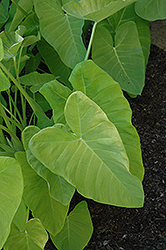It's all about ...
plants

Lime Zinger Elephant's Ear
Xanthosoma 'Lime Zinger'
Height: 4 feet
Spacing: 3 feet
Sunlight:
![]()
Hardiness Zone: (annual)
Description:
This variety produces large chartreuse to lime green heart shaped leaves, creating a tropical look; blooms infrequently, but flowers are interesting; thrives in hot, humid conditions; great container plant as well
Ornamental Features
Lime Zinger Elephant's Ear's attractive large heart-shaped leaves remain lime green in colour throughout the year on a plant with an upright spreading habit of growth. It features unusual spikes of creamy white flowers with buttery yellow bracts rising above the foliage in mid summer.
Landscape Attributes
Lime Zinger Elephant's Ear is an herbaceous annual with an upright spreading habit of growth. Its relatively coarse texture can be used to stand it apart from other garden plants with finer foliage.
This is a relatively low maintenance plant, and should never be pruned except to remove any dieback, as it tends not to take pruning well. It has no significant negative characteristics.
Lime Zinger Elephant's Ear is recommended for the following landscape applications;
- Accent
- Mass Planting
- General Garden Use
Planting & Growing
Lime Zinger Elephant's Ear will grow to be about 4 feet tall at maturity, with a spread of 4 feet. When grown in masses or used as a bedding plant, individual plants should be spaced approximately 3 feet apart. Although it's not a true annual, this plant can be expected to behave as an annual in our climate if left outdoors over the winter, usually needing replacement the following year. As such, gardeners should take into consideration that it will perform differently than it would in its native habitat.
This plant should be grown in a location with partial shade or which is shaded from the hot afternoon sun. It does best in average to evenly moist conditions, but will not tolerate standing water. It is not particular as to soil type or pH. It is highly tolerant of urban pollution and will even thrive in inner city environments, and will benefit from being planted in a relatively sheltered location. Consider applying a thick mulch around the root zone in winter to protect it in exposed locations or colder microclimates. This particular variety is an interspecific hybrid. It can be propagated by multiplication of the underground bulbs; however, as a cultivated variety, be aware that it may be subject to certain restrictions or prohibitions on propagation.
